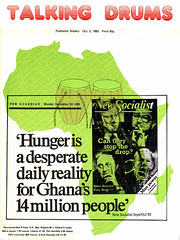What The Papers Say
America In Lebanon
In the wake of the raging anarchy into which Lebanon was thrown as a result of its invasion by Israeli forces last year, the arrival of the present four-nation peace-keeping forces of America, Britain, France and Italy, drew a sigh of relief from men of goodwill for war-battered Lebanon. This was because the international peace-keeping force was expected to guarantee peace and stability in Lebanon and give the new Lebanese Government an opportunity to form a stable government.One year later, however, that dream now appears a nightmare. Druze militia, a group of armed Lebanese Moslems, have taken up arms to reverse the present balance of power in Lebanon.
Their clashes with the Lebanese army and their other attempts to control parts of the country have resulted in the death of six American marines and a few other soldiers of the international force.
In a move to protect American soldiers in Lebanon, President Ronald Reagan recently beefed up American military presence around Beirut, the Lebanese capital. He also ordered the marines to take retaliatory measures, including air-strikes and heavy shelling, against Druze strongholds.
Arguably, the American response was to "serve notice to Syria, the assumed backer of the Druze militia, that the United States was ready to escalate its fire-power in Lebanon. It was also meant to show American allies that the Reagan Administration is committed to firm actions whenever confronted by any power or group.
This is where lies the new tragedy for Lebanon. America's resolve to defend her troops, ideally, is a rational decision. But the history of American involvement in similar situations elsewhere like Vietnam, makes the line between defensive retaliatory measures and aggression too thin for either comfort or international sanction.
We strongly believe that America's escalation of the Lebanese crisis will naturally prompt the Soviet Union into more concerted support for her client, Syria, which is a major military power in today's Lebanon. The possible confrontation of the superpowers in Lebanon is dangerous to world peace in general, and a threat, in particular, to all hopes of resolving the Lebanese crisis.
This is why we appeal to all Lebanese-Christians, and Moslems - to swallow their differences and seek a peaceful, negotiated settlement of the crisis. It is obvious that the losers in an East-West confrontation over the current situation in Lebanon are the Lebanese themselves.
To the Americans, we call for a halt to Reagan's military pretensions in Lebanon. An international peace-keeping force that surprisingly includes only the Western powers shows that the West has much at stake in that country. The best way to keep Lebanon under its influence is for the West to encourage peace in that country, and not to give it more wars.
Daily Times, Nigeria
Arms And The World
Yesterday arms negotiators were to reconvene in Gene to continue their talks on medium range missiles in Europe The North Atlantic Treaty Organization (NATO) countries are committed to stationing American missiles in Europe unless the Soviet Union and the United States reach an arms agreement by the end of this year.The current phase of the talks is the last one before deployment begins and is therefore the most crucial. This phase of the talks must produce some positive result because not to do so entails a lot of cost to the whole world.
No one needs to be reminded of the enormous cost of the cold war now raging on between the US and the USSR. It is true that these two countries have had an ambivalent relationship since the anti-fascist, anti-nazi coalition broke up after the Second World War but the 1970's witnessed a period of near normalcy when relation between the two countries were characterized by detente and several confidence-building measures.
The election of Mr Ronald Reagan unfortunately changed a lot of things. Of course, before the advent of Reagan the NATO had decided to beef up its missile count in Europe to off-set what it perceives as Soviet superiority in Europe. But Mr Reagan and his team have pushed the issue to limits of dangerous consequences.
At one point, it was almost clear that the Americans did not want any agreement at all, given the kind of concessions they sought from the Soviets. Thanks to peace forces in Europe and other parts of the world, the United States Administration is now seen to be more serious in its pursuit of an accord.
The Soviet leader, Yuri Andropov has given the negotiators a new proposal. He has proposed that the Soviet Union will liquidate and not relocate any missiles that would be removed from the European front. The "PEOPLE'S DAILY GRAPHIC" is of the opinion that this proposal has raised the quality of the negotiations by its seriousness and therefore, constitutes a good starting point for the present phase of the talks.
Talks involving these two giant nations on issues affecting their own and their allies' security are bound to be long and difficult but we hope that everyone realizes that what is at stake is the security of the whole world and the survival of human civilization.
Therefore, we of the "GRAPHIC" urge the Governments of the Soviet Union and the United States to be both flexible and serious in seeking a mutually acceptable formula on Euro-missiles.
The world needs peace and a Euro-missile agreement will go a long way towards ensuring that the super powers can always talk among themselves and to each other to ensure that peace prevails.
Daily Graphic, Ghana
